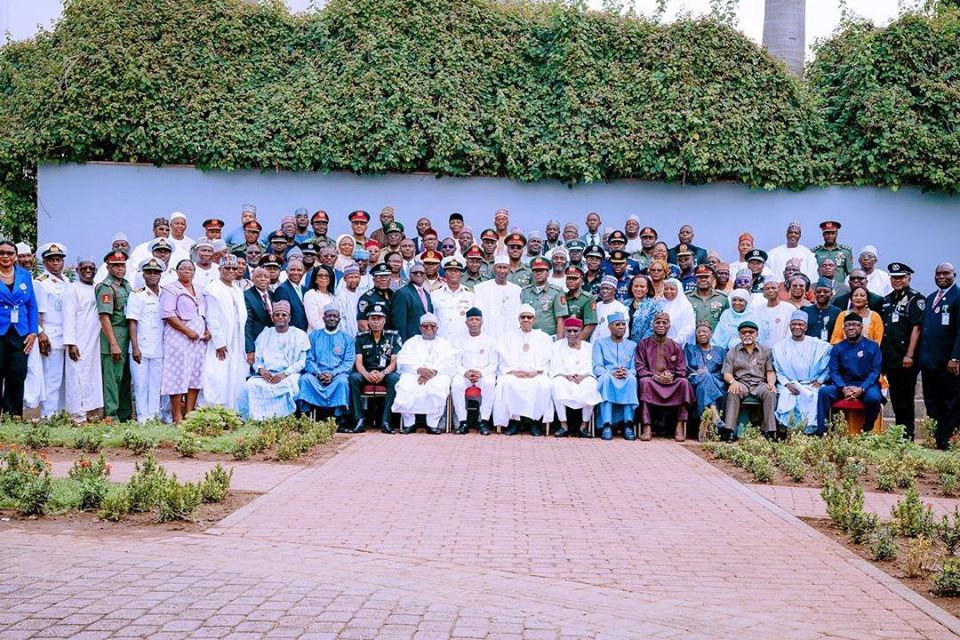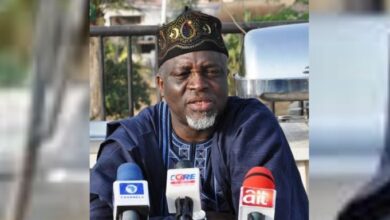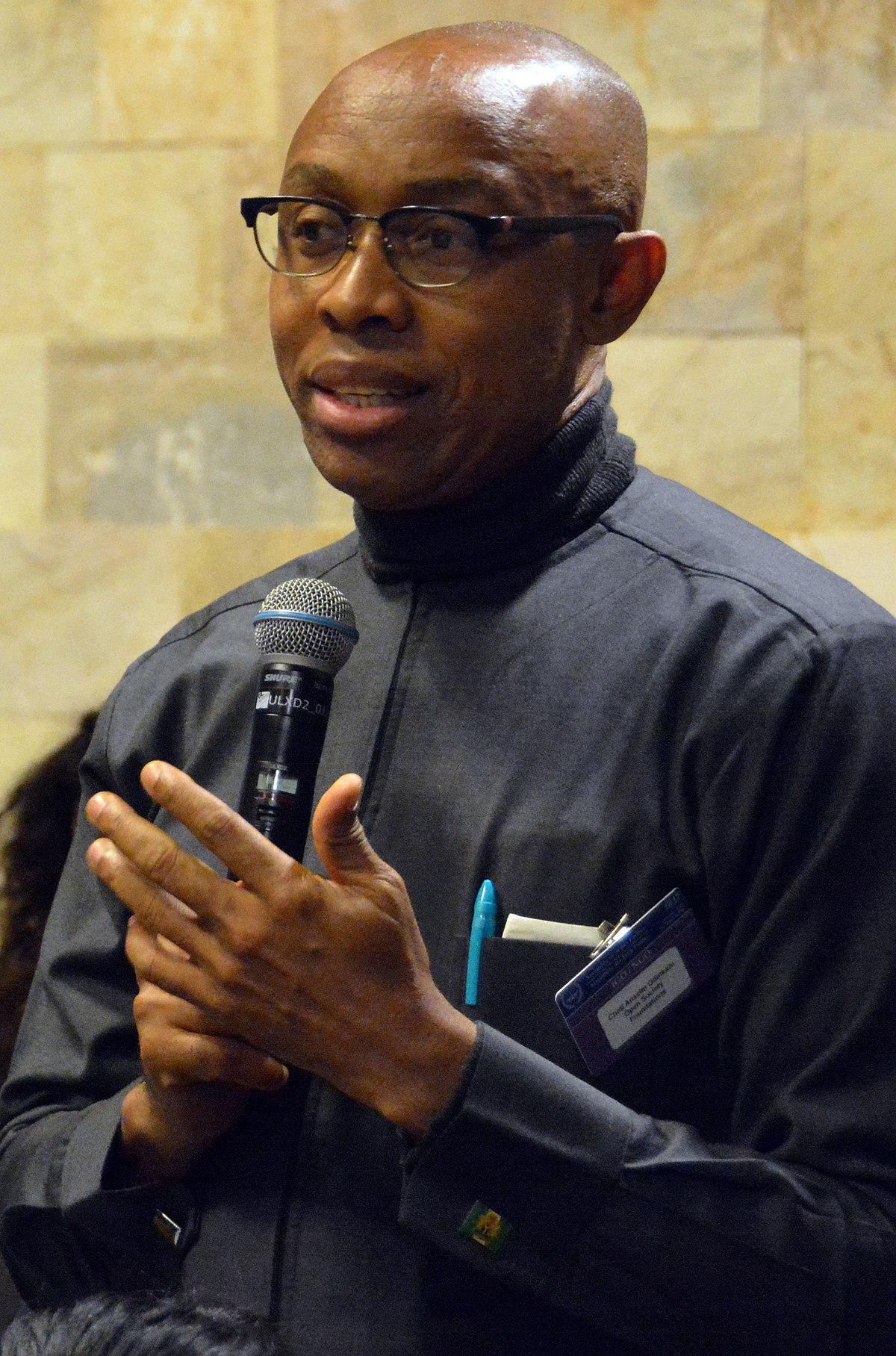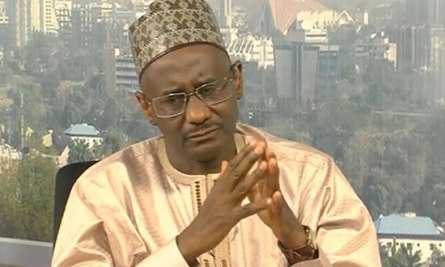Nigeria problem not lack of policy but implementation, Osinbajo declares s at NIPSS graduation, says country now needs rigour, discipline to implement

Nigeria’s Vice President Yemi Osinbajo says it is high time the country develops rigour and discipline to implement policies, adding that the nation’s problem is not the lack of policy but the implementation.
This he said in his address a the graduation ceremony of the Senior Executive Court 41 of 2019 of the National Institute for Policy and Strategic Studies (NIPSS), Kuru, Jos, Plateau State on Saturday.
VP Osinbajo, according to a statement sent to The DEFENDER by Senior Special Assistant to the President on Media and Publicity Office of the Vice President Mr. Laolu Akande, said in ensuring this the NIPSS must graduate from a “think-tank” to “do-tank”.
He said: “One thing that we must bear in mind, which is my challenge to NIPSS; the problem of Nigeria has never been a shortage of ideas, there is no policy that has never been thought of, but the problem has always been implementation.
“In my respectful view, NIPSS must graduate from a “think-tank” to “do-tank”, and this is the case. We are at a point in our country where policy is not the issue, but the rigour and discipline that is required to implement is what is needed.
“I want to urge NIPSS, that our subsequent studies must be based on the need to attain some level of understanding of how to implement and get things done. Once we are able to do that, we are on our way.”
Below is the full text of the Vice President’s Speech:
SPEECH BY HIS EXCELLENCY, PROF. YEMI OSINBAJO, SAN, GCON, VICE PRESIDENT OF THE FEDERAL REPUBLIC OF NIGERIA, AT THE GRADUATION CEREMONY OF THE SENIOR EXECUTIVE COURSE 41 OF 2019 OF THE NATIONAL INSTITUTE FOR POLICY AND STRATEGIC STUDIES (NIPSS) ON SATURDAY, 23RD OF NOVEMBER, 2019
It is a special pleasure to be here at this graduation ceremony of the Senior Executive Course 41 of 2019 of the National Institute for Policy and Strategic Studies. I bring you the warm felicitations of President Muhammadu Buhari, President, Commander-in-Chief of the Armed Forces. And on his behalf, I congratulate you all, participants of the Senior Executive Course, for your stellar performance and your elevation to the privilege of Member of the National Institute, MNI.
I also congratulate family and friends, and especially, spouses of participants on this joyful occasion. NIPSS is our Nation’s foremost think tank. It is here over the years that major policy issues have been originated, debated or proffered.
By bringing together some of the brightest and best Nigerian minds from the armed and non-armed services, business, labour, and the professions to think through policy ideas and options, NIPSS affirms the eminently correct notion that our country is strong because of its tremendous human capital and the richer by its diversity, which leads me to the seminal presentation that this course made yesterday to the President and members of the Federal Executive Council on the crucial subject of “Funding Universal Healthcare Delivery in Nigeria”.
Your in-depth assessment of the issues and insightful recommendations deserve every commendation. Just as the President said yesterday, they certainly will go into thinking through our financing policy, but more importantly, they will form the pillars of our health policies. NIPSS must remain the go-to institution for thinking ahead for our Nation’s development.
Permit me then to say a few words about a phenomenon that we all accept will fundamentally determine the future of our nation and indeed our world, that is the technology revolution, described, I think, accurately as the Fourth Industrial Revolution. To quote Klaus Schwab, founder of the World Economic Forum, “The First Industrial Revolution used water and steam power to mechanize production. The Second used electric power to create mass production. The Third used electronics and information technology to automate production. Now a Fourth Industrial Revolution is building on the Third; the digital revolution that has been occurring since the middle of the last century. It is characterized by a fusion of technologies that is blurring the lines between the physical, digital and biological spheres.”
The speed and scope of this Fourth Revolution clearly outstrips all previous revolutions put together, the frequency and speed of breakthroughs is mind boggling and the disruption to every aspect of human existence – from healthcare to education, business, agriculture, the professions, entertainment, the arts, security, warfare, sports – is as varied as it is profound. For example, take the smartphone that we all carry, it has 100 times more computing power than the Apollo aircraft that landed men on the moon in 1969. The average smartphone has the capacity to store and access more information than is available in most standard libraries. The phone, through various platforms, connects the user to millions of other phone users all over the world, creating enormous market possibilities. And these possibilities, observes Schwab, “will be multiplied by emerging technology breakthroughs in fields such as artificial intelligence, robotics, the Internet of Things, autonomous vehicles, 3-D printing, nanotechnology, biotechnology, materials science, energy storage, and quantum computing.”
There is no question that practically minute by minute every aspect of life is being transformed by technology. There is a need to constantly interrogate our current position in the technology story. There is a need to determine what we need to do to leverage on technology to leapfrog in the development journey.
So, let’s take data as an example. There is no doubt that data, big data, which is the aggregation of information from and by various sources and its use in predicting consumer behaviour, or the present and future needs of communities is crucial. Technology is crucial to the collection and the optimized use of data.
For us as government, we recognise the potential benefits to government from the capacity for better forecasting, to greater accuracy with budgetary planning, enhanced security by overcoming the challenges of anonymity and, especially for citizen empowerment through the ability to be able to bring more of the excluded populace into an inclusive economic participation through digital identification of each and every citizen.
This explains the Federal Government’s commitment to the digital registration of all citizens and legal residents, which, in turn, will be linked to the civil registration of birth and death.
In 2015, we began to harmonize existing databases of government bodies. So far, the harmonization process has increased the records of Nigerians in the central identity database from 7 million to more than 37 million. We are adopting an approach similar to the Indian Aadhaar model, aiming to provide all Nigerians with a unique identity by leveraging the existing enrolment facilities of Government Agencies such as the Immigration and the Federal Road Safety Commission, INEC, CBN (through BVN registration) and enforcing this enrolment of Nigerians for the National Identification Number (NIN) so that we have accurate and up-to-date information on our citizens.
With a reliable data base of all Nigerians we are positioned to attain our aspirations for financial inclusion, delivery of social programmes to the remotest parts of the country, and the creation of more effective e-commerce opportunities.
Our N-Power programme, the largest post-tertiary employment and skills development exercise in Africa, is a tribute to the effective use of locally built and deployed technology platform which enabled us to screen and test millions of applicants, and engage and train 500,000 young men and women.
These young men and women are assisting with the shortfall of teachers in primary schools across every Local Government Area in the country, as well as providing agriculture extension services and public health services. Their training and instructions have been largely technology-driven either through materials contained in their hand-held devices or materials available on the digital platform available for their use.
With the advancement of technology in the sphere of artificial intelligence, access to knowledge by humans will no longer be regarded as the focal point of human endeavour. This is important because in the past we used to think only in terms of access to knowledge, but today, artificial intelligence makes it such that rather than just access to knowledge, it is the application of imagination and innovation to knowledge, as well as envisioning the future, that will be the key priorities for individuals, corporations and nations.
Our administration had to envision the future with a dose of imagination and innovation. We know that to thrive, our country needs the fusion of creative minds and creative enterprises on a scale that would make significant national and global impression. And that’s why N-Power Creative was conceived.
President Buhari’s vision for Nigeria’s youth population is clear and simple, that all young Nigerians can access a range of opportunities to improve their skills and meaningfully participate in productive and gainful existence, either in employment or through entrepreneurship. Our aspiration was to place Nigeria as a major player in the production of various digital media assets for various reasons, job creation for young people, a thriving productive economy, and a bigger cultural influence globally. We had to think creatively, fast and big.
The Animation Industry and the Creative Sector offered us a creative and big option and we plunged. Globally, animation & VFX are used widely in many areas like TV, films, games, adverts, medicine, training, education, e-learning, legal and insurance, 3D visualization, architecture, and the list goes on. Animation is labour intensive and requires very high skill levels and is also lucrative for the businesses and the work force.
We envisioned the N-Power Creative training to stimulate the development of creative and technological skills in young Nigerians in a studio environment with 2D and 3D animation, storyboarding, illustration, scriptwriting, voice acting and post-production skills.
In its first year, the programme has trained a total of 3,000 young Nigerians. 1,500 young Nigerians from the South-West, South-South and South-East were in Benin just about four weeks ago, learning these creative skills.
Another 1,500 from the North-East, North-West and North-Central have undertaken a similar exercise. This training also encompasses a practical phase where each of the trainees across the various streams are organized into a studio and get to work together as a typical studio would. Scriptwriters, storyboard artists, voice actors, animators and post-production artists will collaborate as studio teams and go on to produce educational and entertainment content.
The idea is that some will end up as entrepreneurs from the next phase, while others will be absorbed by the industry. The opportunities are huge. The global animation industry is witnessing major structural changes. Importantly, companies are outsourcing computer animation jobs in a big way. Any animation-related production in the United States or Canada is not exclusively produced in that country alone. Work is outsourced to many Asian countries like the Philippines, China, Vietnam, Cambodia, Singapore and India. These Asian countries are not only cost competitive, but are also high on quality and availability of skills.
India, much like Nigeria can be, has honed attractiveness as an animation hub because it has an English-speaking workforce that come at low costs. From industry reports, the average monthly salary of an animation professional in India is US$600 compared to about US$6,000 in North America. It is this arbitrage that we intend to leverage on.
But, as important in making creativity central to our government’s Next Level agenda, so is the fact that it also affords us the opportunity to tell our unique Nigerian stories through digital media and films. Our fast-growing and high exporting creative industries, particularly Nollywood, and music, make a significant contribution already to our economy – they drive employment and help us to share our unique perspective with the world.
Nigeria’s Animation Industry can add more sheen in terms of special effects to Nollywood and our musical performances and extend its aesthetic reach. These are indeed exciting times for that industry.
But how do we deliver Africa’s largest social investment programme, especially through technology on an even larger scale? So far, again, using locally built and deployed digital platforms, we have been able to give loans to two million petty traders and hundreds of cooperatives in our TraderMoni and MarketMoni programmes.
In partnership with the Bank of Industry, which handles the whole process of on boarding of beneficiaries to payment and collection of repayments, not only have we gathered the most reliable data of informal traders across the country, but we have direct access to them for all purposes.
Similarly, working with the World Bank and local technology companies, we have identified and continue to identify the poorest of the poor in every community, as defined by those communities themselves. The identified households benefit from N5,000 monthly allowance under our Conditional Cash Transfer programme. In addition, life skills training is given to a nominated member of each household to enable them make a living for themselves.
But the private sector is thriving even more. Financial inclusion has deepened as a result of the inroads made by the FinTech companies who have leveraged the widespread availability of mobile phones and the associated usage patterns of the people.
As such, using artificial intelligence (AI) technology, they are able offer loans to those many financially excluded by the formal banks based on their digital footprints.
I was in Nasarawa State a couple of weeks ago to see a farm run by an ex-Niger Delta militant, who now has a 3,000-hectare farm in Nasarawa. He couldn’t get a loan from the regular banks but two major FinTech companies came together to give him loans without any collateral. The size of his farm today shows very clearly that the way by which people will receive credit, the ways businesses will be funded, will be driven largely by technology. A lot of the banks have a lot of catching up to do.
Yet another largely untapped mine of well-paying jobs for young people is in the area of Business Process Outsourcing. BPO, to use an acronym, is the farming out of certain non-core functions of a company to third party companies who can render such services cheaper and more efficiently. The type of services include payroll, accounting, telemarketing, customer support such as trouble shooting for consumer technology devices, data recording, social media marketing etc. Technology is opening up those opportunities today.
There is a lady, Amal Hassan, in Kaduna State, who provides knowledge and business process outsourcing (BPO) for organizations within various sectors that want to outsource their customer care. Her company, Outsource Global, has emerged as the leading Nigerian and, indeed, African contact centre provider servicing the international market, turning the company into a global BPO giant, creating over 1,500 jobs.
Her success is an example of how technology can provide job opportunities for thousands of Nigerians. India, for example, is estimated to have provided more than 2.8 million jobs in the business process outsourcing industry. It is very clear that Nigeria is a major rival to India in being able to provide BPO. We speak English without tonal accent and that is much better than any of the Asian countries, so that is a major advantage.
Healthcare is one of the areas where technology is revolutionizing value chains. We are already in discussions with Nigerian medical experts in diaspora about the use of telemedicine, deployment of teaching aids via by WiFi enabled or USSD means, to train paramedics in far flung rural communities. There are so many examples of how technology is moving the pace of healthcare in Nigeria.
There is a company called LifeBank, run by Temi Giwa, that delivers blood from labs to hospitals across Africa, and which recently began using drone technology to make these life-saving deliveries even quicker. The founder, Temi, just won technology entrepreneur Jack Ma’s Africa Business Hero Award last week, going home with $250,000, to help keep LifeBank going. LifeBank is an example of how technology can impact the healthcare industry and save millions of lives.
For example, the World Health Organisation estimates that about 93% of all malaria deaths in 2017 occurred in Africa. Also, 61% (about 266,000) of all malaria deaths worldwide were children under the age of five. In theory, with drone technology like that of LifeBank, vaccines, prophylactics and thousands of blood samples could be obtained from patients, transported to labs with the drones, and necessary medication returned to patients in record time.
This alone can save the lives of hundreds of thousands of children in rural areas in Nigeria. With what is available with technology today, the opportunities are great and we can leapfrog because there is so much room for leapfrogging. We don’t have to evolve through the decades again, we are already positioned to take advantage of technology to move development further.
Agriculture is another sector that is being transformed by digital technology. The report of the NIPSS 39th Course titled “Science, Technology and Innovation for the Development of Agriculture & Agro-Allied Industries in Nigeria” notes how the use of technology and innovation has led to improved crop yields about 530 varieties of 37 crops developed as at 2017. Cassava yields have increased by 60 per cent in the past three decades, and maize yields have increased at an average of 5.5 per cent per year between 2000 and present day. Rice yields increased by 30 per cent from 2007 to present day with the use of Faro 1-44, NEWRICA improved drought tolerant varieties (Haggai 2017.) It is clear that agriculture does not have to remain at the subsistent level it is in many parts of the country. There is great improvement going on with the quality of inputs and so the yields are getting better.
Genotyping or the development of pest and disease resistant crops/livestock such as Maruca resulted in 80 per cent increase in yield of cowpea alone.
Nigeria’s lead in the world production of crops such as cassava, yam and cocoyam have been assured by the research and a lot of what we have seen coming out of the agricultural industry. The prospects are huge for maximizing agricultural production, but also for significantly improving the logistics of storage, and the farm to market value chains.
But the more exciting news is the use of technology for more effective private sector financing of agriculture. For example, Farmcrowdy and Thrive Agric are digital agriculture portals that crowdsource funding for farms across Nigeria. So, they pool together money from multiple investors to establish farms and hire smallholder farmers. They then pay the investors dividends from the harvests from these farms.
It is evident that our rapidly increasing population and the advent of the fourth industrial revolution has posed several different challenges, but it is clear also that those challenges can be resolved, and we can do all manner of things using technology.
The educational challenge before us is one. It is obvious from the new curriculum we are developing, the STEAM education in Nigeria – Science, Technology, Engineering Arts and Maths, technology is going to enable us to benefit maximally from technology and have now identified early stage investment in primary and secondary schools all the way to tertiary education as key to achieving Nigeria’s economic aspiration of becoming a knowledge-driven economy. We are poised to do some incredible things.
One thing that we must bear in mind, which is my challenge to NIPSS; the problem of Nigeria has never been a shortage of ideas, there is no policy that has never been thought of, but the problem has always been implementation.
In my respectful view, NIPSS must graduate from a “think-tank” to “do-tank”, and this is the case. We are at a point in our country where policy is not the issue, but the rigour and discipline that is required to implement is what is needed.
I want to urge NIPSS, that our subsequent studies must be based on the need to attain some level of understanding of how to implement and get things done. Once we are able to do that, we are on our way.
Let me congratulate all our participants for the very excellent performance, and also congratulate the new Director-General of the Institute, who has already shown that a lot more is going to happen here in NIPSS, as well as the directing staff for the excellent work they are doing.
I say to the family and friends, congratulations, well done and God bless you.








